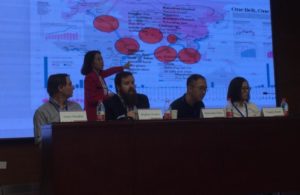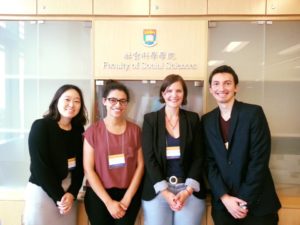I had not gone back to China since I left Beijing after dissertation fieldwork on July 31, 2012. So my visit to China marked a return in almost five years. The Zhou Enlai School of Government of Nankai University in Tianjin, where I gave my first presentation within mainland China in 2008, had built a new campus in Jinnan, faraway from the main campus. The Zhou Enlai School had relocated to the new Jinnan campus.

Presenting ‘China’s Expansion in the Middle East: Power Vacuum, Engagement, and Contest in the Divided Region’ at the Zhou Enlai School of Government, Nankai University, Tianjin, China, June 11, 2017.
This year’s conference at Nankai focused heavily on China’s global initiatives via the Asian Infrastructure Investment Bank (AIIB) and the Belt and Road Initiative (BRI). The big division between Chinese domestic scholars and international scholars lies in whether China is moving with a strategic intent along the BRI. What may seem as a pure economic objective for Chinese scholars did not seem to be the case for scholars from outside China. And to my dismay, Chinese scholars did not seem very interested in China’s interaction with the Middle East or Central Asia, or did not seem very well informed about the regions.

With panelists Zeinab Shukur from Iraq/US, Dorothée Vandamme from Belgium, and Ege Han from Turkey of the panel on ‘China and the Islamic World: The Middle East and South Asia’, The University of Hong Kong, June 15, 2017.
For some reason, the discourse on the two major initiatives that China has taken on seemed to embody an inward-looking ideological path in assessing China’s initiatives. I visited Beijing via Tianjin, where I witnessed some changes compared to the days when I lived in China. Capital controls were being strongly enforced more than ever, e-commerce using WeChat pay and Alipay were commonplace, and ‘mobike’s were available all around (they can be found in Singapore as well.)
I headed to Hong Kong from Beijing to give the same presentation I gave in Tianjin. The panel was attended mainly by non-Chinese scholars, but the discussions were much more in-depth. I look forward to collaborating with the panelists in the future. For now, the paper is being prepared for send-off to a policy journal focusing on the Middle East.
Hong Kong is going through a rapid transformation. While Hong Kong remains a big financial hub in Asia, I have come to doubt that it is a global city.
